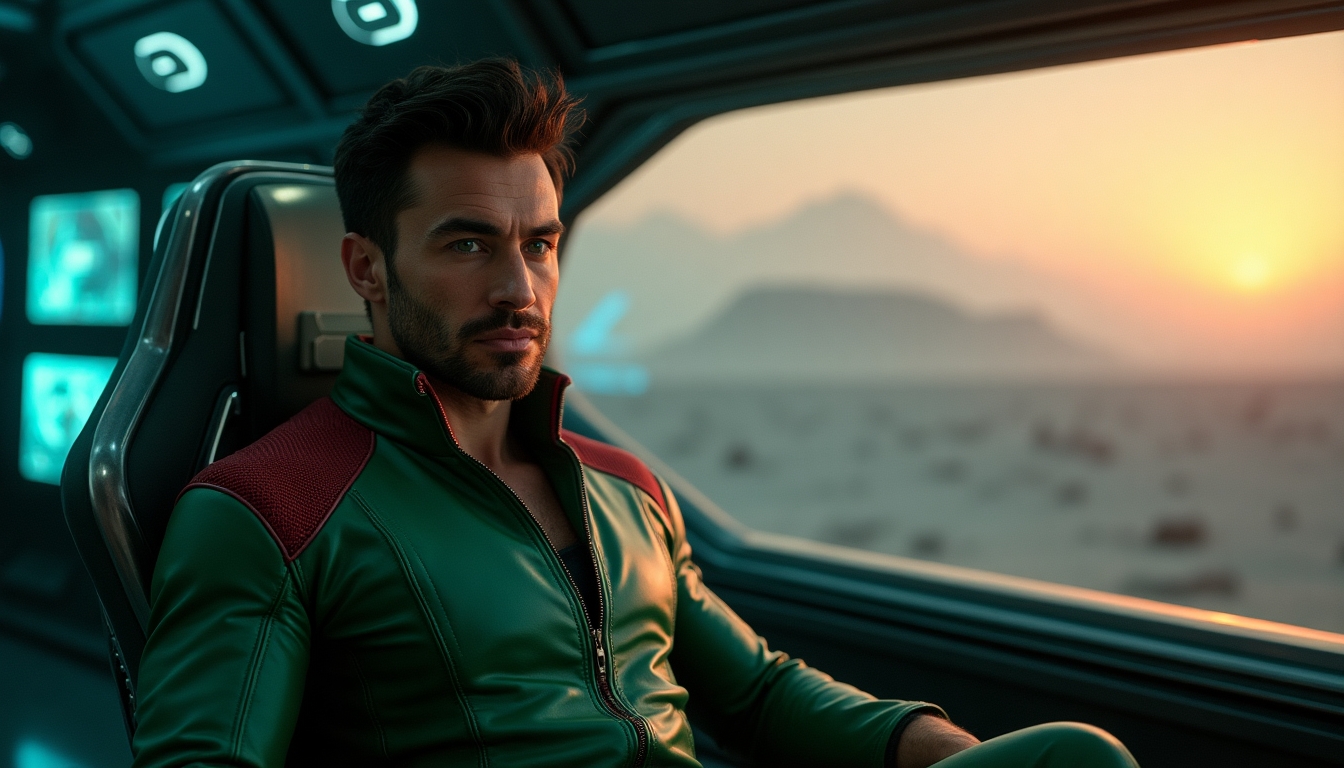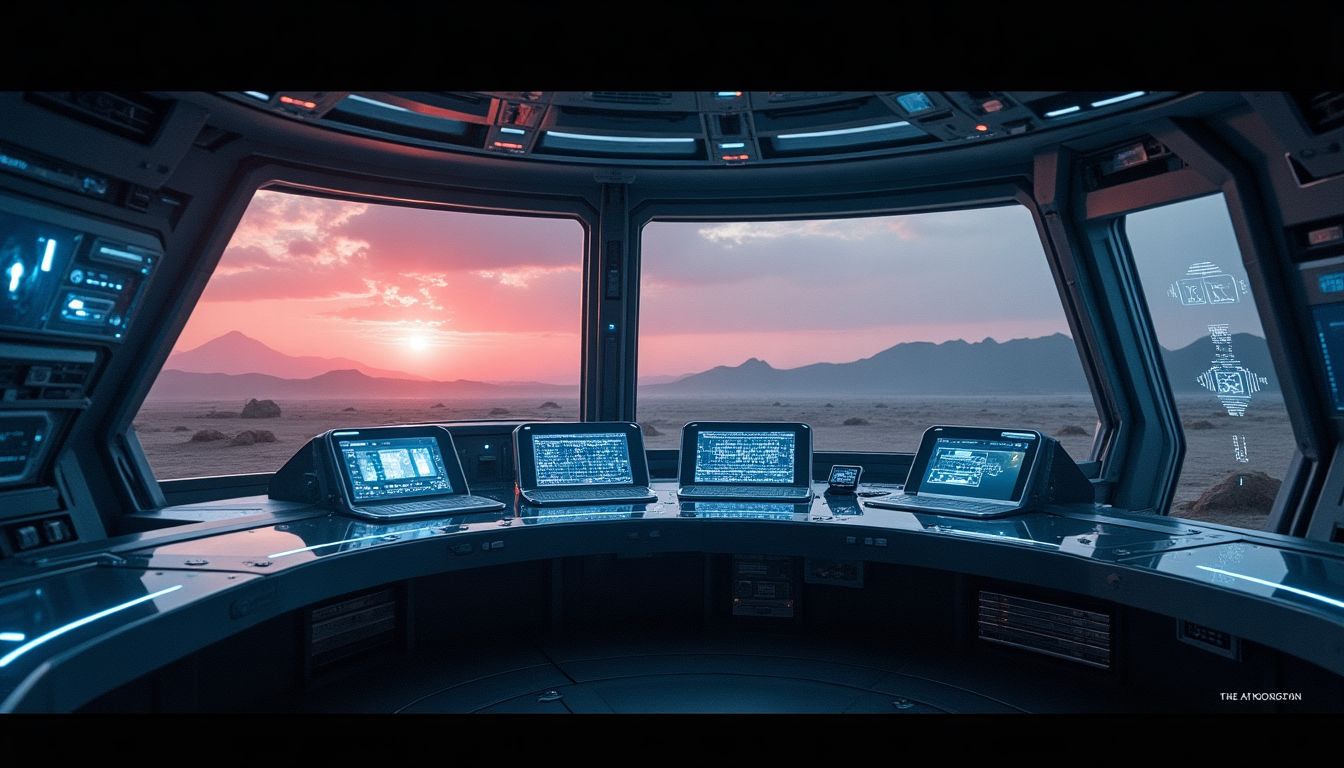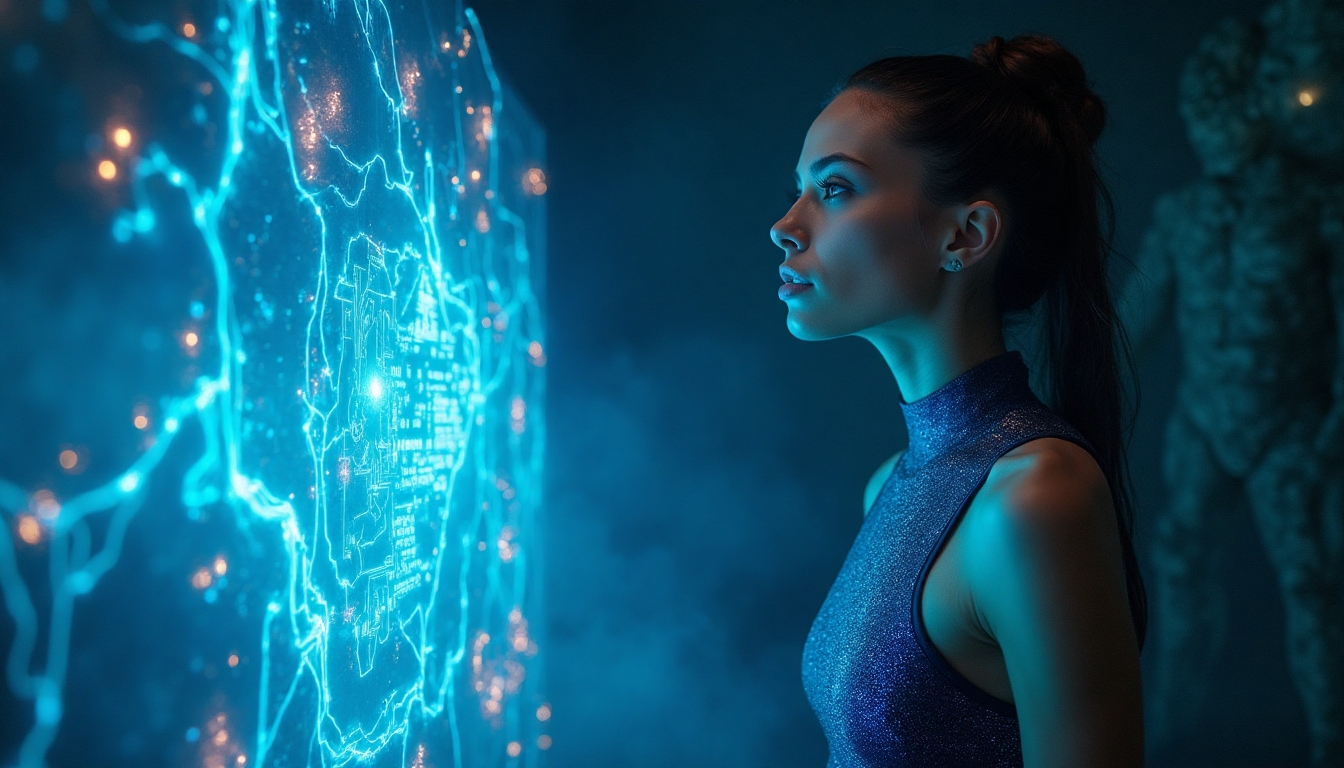Planet 7-Gamma
The spacecraft blinked into existence above the barren planet, its mirrored hull catching the distant light of a dying star. A mosaic of dazzling steel and delicate AI circuitry, it hovered silently, scanning the dusty surface below. Inside, Commander Finn Avenstone sat in his obsidian-black chair, staring at the holographic displays flickering around him. His uniform—a deep emerald-green leather jumpsuit with crimson piping—clung tightly to him, reminiscent of the streamlined fabrics from a mid-20th-century imagining of the future.
"Planet 7-Gamma," a soothing AI voice interjected. "Atmosphere: nitrogen-heavy with trace amounts of methane. No signs of organic life detected. Terraforming viability: 64%."
Finn's jaw clenched. Across centuries of time and light-years of space, he had come to accept that most planets he visited would be this way—silent, hopeful ghosts waiting for their rebirth. But years spent as the last remnant of humanity had worn him down. He was no gardener scattering seeds in fertile ground; he was a haunted man, tasked with sowing the legacy of a species.
"Deploy the spheres," he said quietly, his voice carrying the weight of rituals performed too many times.
Above him, compartments opened in the sleek silver belly of the seed ship Eden’s Echo. Dozens of glowing pods, each the size of a clenched fist, emerged and drifted out into the exosphere. They were armed with DNA banks, atmospheric scrubbers, and nanobots pre-programmed for soil enrichment. They would burrow into the planet’s crust and begin their slow, systemic transformation.
As the pods descended, Finn leaned back, staring at the holographic render of the planet's surface. The AI's voice returned, calmly reporting temperature differentials and trajectory maps, but Finn wasn't listening. Instead, his mind wandered back to a time when these missions had a different context—when he was not alone.
There had been six of them in the beginning: the last crew of humanity’s final ship, tasked with planting life among the stars. They had launched amid chaos, Earth's ecosystems collapsing under the weight of centuries of neglect; the blue planet had grown gray, and its people desperate. Finn vividly remembered the final address delivered in solemn tones by the Earth's last coalition of nations—a delicate blend of hope and resignation.
"You are our legacy," they’d said. "If Earth is no more, then humanity may yet endure—somewhere, someday."
Those words clung to him like an insidious ghost. Humanity may endure. And when the mission began, it had felt like it might succeed. The first planet, Nova Cetari Beta, had sprung to life with brilliant verdant fields as Finn and his crew watched, awe coursing through them. But the triumph was fleeting. One by one, the others had succumbed to the unrelenting demands of the mission.
Jarah succumbed to an asteroid impact on the outskirts of a red dwarf system. Emilia wasted away in the cold vacuum of cryosleep malfunction. Penelope fell inward, her mind unable to handle the endless void. Even Alex, the ever-resilient one, had whispered his final goodbye before the radiation poisoning rendered him silent. Life had left them all.
All but Finn.
A rattle shook Finn's thoughts back into the present. Something was wrong. His interface glitched ominously, arcs of cobalt-blue flickering like fire.
"Eden?" he called, using the ship's AI moniker.
"I’ve detected an anomaly in Seed Pod 07-Raph," Eden replied, her voice flat but tinged with faint urgency.
"What anomaly?"
"Pod 07-Raph has ceased integration routines and initiated self-replication without prior command. Its trajectory pattern suggests... deviation."
Eden paused briefly, as though hesitating to form the words.
"Deviation toward a nearby satellite. Signal scans suggest artificial emissions."
Finn’s eyes narrowed. Artificial emissions? Could it be… intelligent life?
"Magnify," he ordered.
A hologram spiraled into focus. It wasn't a satellite at all—it was a structure. Spindly arches of tarnished metal wove a skeletal tower against the black backdrop of stars. Defensive lasers lined its ridges, though some seemed inactive, a few bent as if by an ancient collision. Ruin, Finn realized. Abandoned ruin.
"Chart this system. How old is it?"
"Approximately 6.2 million years," Eden replied.
Finn felt a chill running through him. It didn't make sense. Humanity's seed ships had been the first. Or so everyone believed. They were supposed to be alone out here, scribbling their biological graffiti across the vast emptiness of a sterile galaxy.
"We’re docking," Finn decided instinctively.
"That is inadvisable," Eden noted calmly. "Atmospheric scans suggest high corrosion risk and minimal survival guarantees—"
"Override."
The command carried a harsh finality, silencing the AI. Finn barely felt the tremor of the ship as it altered course, his mind laser-focused on the feeds of the massive structure.
The interior was a mesh of alien engineering and eerie familiarity. The air smelled of rust and decay, and the floor panels groaned under his boots. Finn swept his wrist-lamp across faded murals etched into steel walls. They depicted figures not unlike humans, standing beneath clusters of seven glowing orbs—seed pods?
Navigation brought him to the heart of the construct. There, amid curling tendrils of long-extinct machinery, sat a single glowing sphere. It hovered inches above a podium, pulsating faintly as if alive. Symbols were inscribed around its base, their edges worn smooth by time. Finn couldn't read the language, but the meaning was bone-deep:
"We failed."
For countless millennia, another race had tried what humanity now pursued. They, too, had planted the seeds of life. But something had gone wrong. The ruins, the abandoned technology, the corrupted planets—it was a message written in the ink of desolation. They had fallen long before humanity’s rise.
Finn knelt before the glowing sphere, gazing into its pulsating aura, as if it might whisper the secrets of its creators. Instead, his reflection stared back at him: a solitary man, emerald jumpsuit catching the soft light of the pod, a figure out of place and out of time amidst the downfall of a civilization.
And then came the question gnawing at the edges of his mind—a question more haunting than the ruins around him: Was humanity doomed to repeat the same fate?
Finn rose and turned back toward the ship, the glow of the sphere fading behind him. As he sealed his helmet for the return journey, he muttered into the void, "Not if I can help it."
The Source...check out the great article that inspired this amazing short story: Interstellar Seed Ships: How AI Could Revolutionize Space Colonization and Spread Life Across the Galaxy
Disclaimer: This article may contain affiliate links. If you click on these links and make a purchase, we may receive a commission at no additional cost to you. Our recommendations and reviews are always independent and objective, aiming to provide you with the best information and resources.
Get Exclusive Stories, Photos, Art & Offers - Subscribe Today!

























Post Comment
You must be logged in to post a comment.